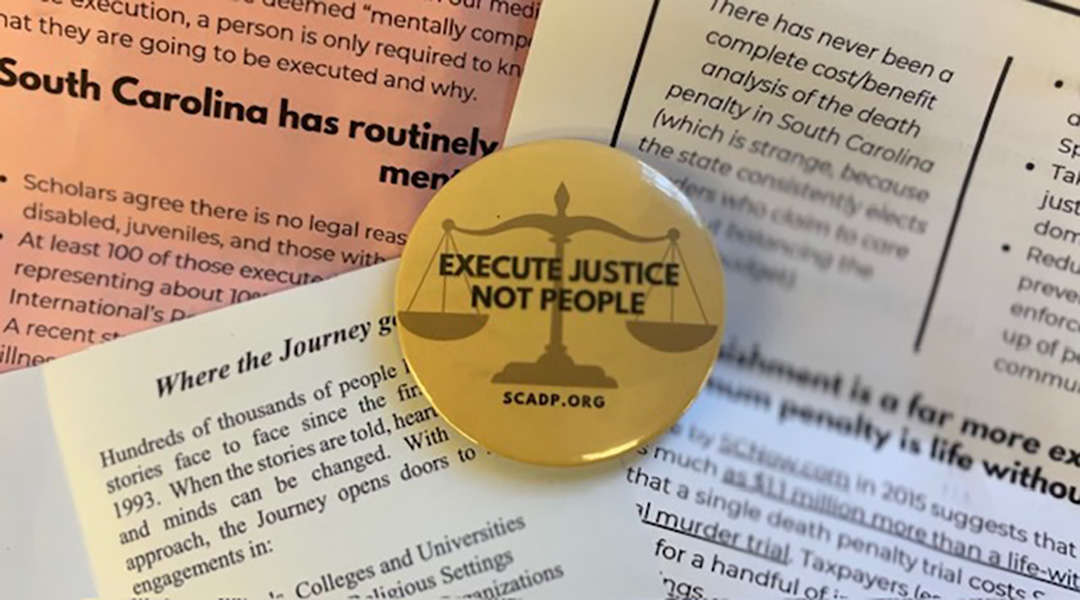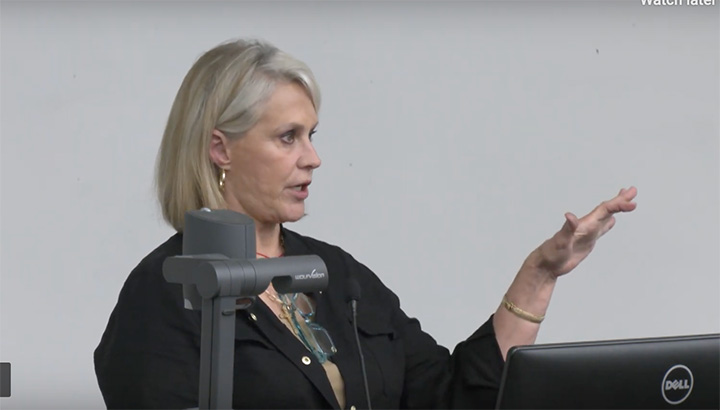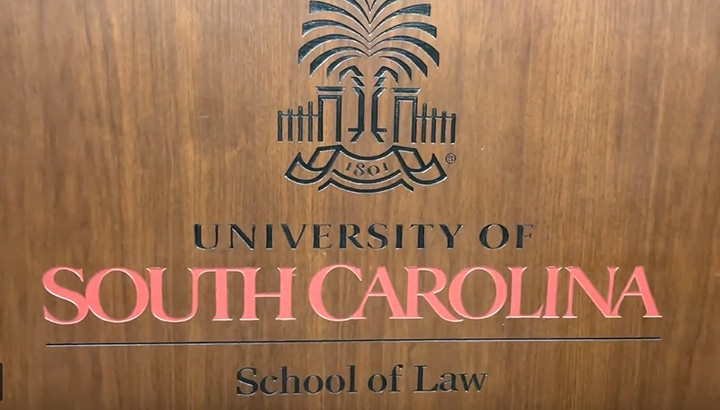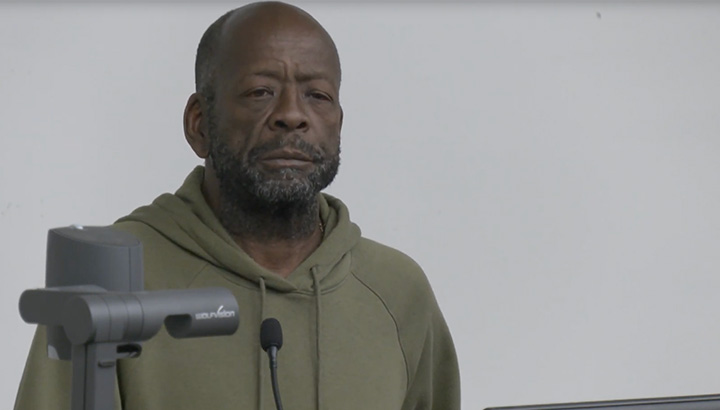Flyers and a button from South Carolinians for Alternatives to the Death Penalty (Photo illustration by Madeline Hager/Carolina News and Reporter)
College students and community members are speaking out as South Carolina prepares to resume public executions using lethal injection drugs.
Representatives from Journey of Hope and South Carolinians for Alternatives to the Death Penalty advocated against the death penalty recently at the University of South Carolina’s School of Law.
Members of both advocacy groups gave personal testimonies about their views on the death penalty and criminal justice reform.
Terri Steinberg, Journey of Hope board member, became involved with the group two days after her son was sentenced for a crime he didn’t commit.
“There’s nothing to describe what it’s like to have a family member in prison,” Steinberg said. “When one goes to prison, we all go.”
South Carolina law states that Death Row prisoners should be “executed by the electric chair, unless the individual elects for the firing squad or lethal injection.” In September, South Carolina acquired the necessary drugs to resume executions paused by supply chain issues, and Gov. Henry McMaster and said the state plans to go forward.
A circuit court judge last year ruled that both lethal injection and the electric chair are unconstitutional methods of execution. The state appealed to the S.C. Supreme Court, which has yet to rule, despite McMaster saying the process is going forward.
“Judge (Jocelyn) Newman in Richland County ruled that both methods are unconstitutional under our constitution, which bars cruel, corporal or unusual punishment,” Vann said.
Steinberg said the one of the arguments against the death penalty that people respond to most is when they hear how expensive it is.
“I can think of so many more, so many better things we could do with that money, other than plotting and planning a person’s death,” she said.
”The figures that we’ve heard from Arizona, which was the state that most recently got lethal injection drugs, they spent $1.5 million, and they put one person to death,” said Linsey Vann, a representative for Justice 360, a South Carolina organization that advocates for fairness in the criminal justice system.
Vann also spoke about the recently passed state secrecy bill, which allows the government to protect the identity of the drug manufacturers and suppliers.
Moses Peterson, who was once on Death Row but saw his conviction overturned, shed a few tears while he shared his story at the law school.
“I’m not just against the death penalty because I was there, I was against it before I even went there,” Peterson said.
Peterson’s crime was committed in 1983, which ended in him and his co-defendant being sentenced to death. While Peterson was charged with murder, he said he didn’t know anyone was killed until the next day.
Since Peterson was released from prison two years ago, he has been traveling with Journey of Hope, advocating and sharing his personal encounter with Death Row. He has done his best to right his wrongs, but it is still hard, he said.
“Sometimes I feel like I’m still locked up,” Peterson said.
Peterson hopes that through speaking about his experience he can prevent others from making his mistakes.
”If I could just reach one, and that one could reach one, it’ll spread,” Peterson said.
Journey of Hope believes the death penalty doesn’t just affect the victim but everyone involved.
Sherrerd Hartness, of the Columbia area, describes herself as a co-victim of the death penalty. She spoke at the event about her sister, who was shot to death. Her sister’s killer was sentenced to death and executed, something that Hartness said has haunted her for a while.
“It has taken me a couple of years to just almost be able to utter those words the way I’m speaking them to you now,” Hartness said. “It’s very scary. Seeing images of the electric chair or anything like that are extremely triggering.”
In spite of this, Hartness chooses to speak out against the death penalty.
“If the solution is to kill somebody, execute somebody who has killed another person, I think that is extremely shortsighted,” Hartness said. “Every person has some kind of family somewhere. And even if they are the last person living in their family, they have some sort of friendships.”
Kimyatter Southern, an event attendee, doesn’t support the death penalty. She said there are other ways to punish people.
“My family has suffered a lot from gun violence,” Southern said. “I’ve had several cousins that were murdered in different cities in the did she say U.S.”
Her history with gun violence gives Southern a different perspective.
“There is a problem with our American justice system, and until that’s resolved, I will never be an advocate for the death penalty,” she said.
Sherrerd Hartness, whose sister’s killer was executed by the state, speaks out against the death penalty and its impact on her.
Members of Palmetto Journey of Hope gathered Oct. 16 at the University of South Carolina School of Law to criticize the death penalty.
Moses Peterson, whose death penalty conviction was overturned two-years ago, shares his experiences.





